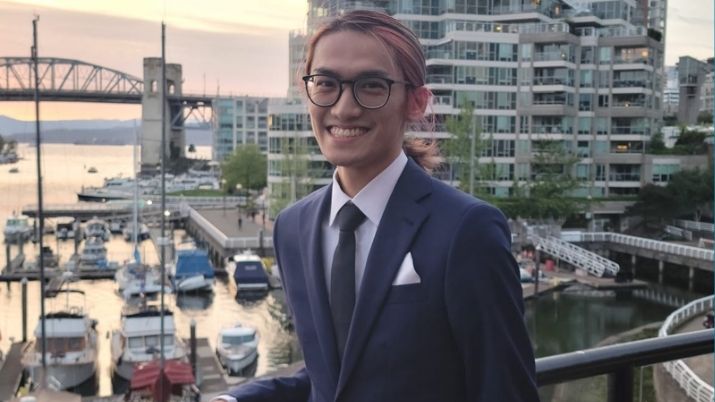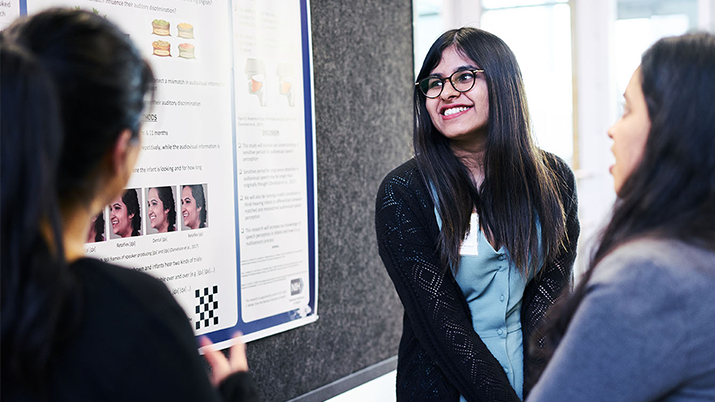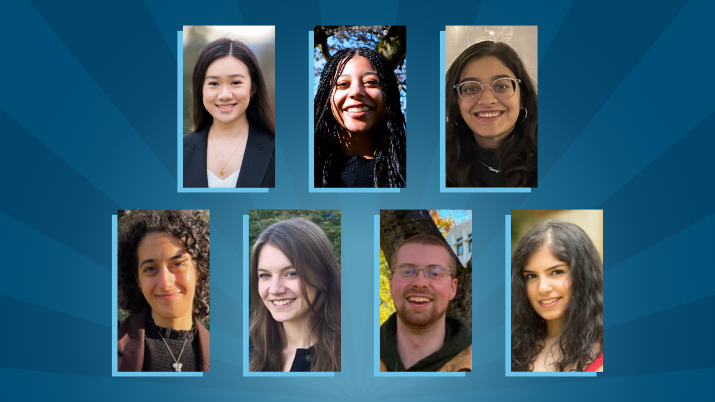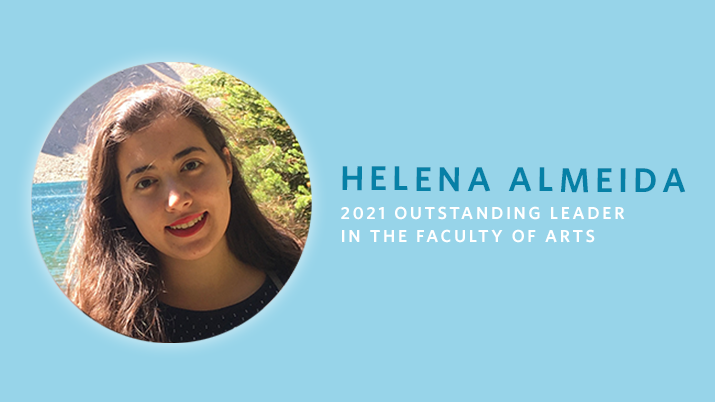

Helena Almeida, a psychology undergraduate student, has received a 2021 Outstanding Leader in the Faculty of Arts award for her considerable dedication and achievement within the Faculty of Arts.
“To me being a leader, both in the UBC Arts community and in the world, means taking responsibility. There is the responsibility of taking initiative, reaching out to other people, turning ideas into actions, and daring to believe that, uncertain as it all may be, trying is worthwhile.”
Helena Almeida (she/her)
Hometown: Brasilia, Brazil
Program of Study: Honours in English Literature, Major in Psychology
UBC Awards: Wesbrook Scholar, Martha C. Piper Arts Award in Global Citizenship, Margaret Lawrence Scholarship in Arts, Katherine Brearley Arts Scholarship, Wallace and Ethel Wilson Scholarship, William and Nona Heaslip Scholarship, Robert and Kazuko Barker Award, Trek Excellence Scholarship, International Leader of Tomorrow Award
UBC Affiliations: UBC English Students’ Association
How can we connect with you?
LinkedIn
Why did you choose your academic program of study?
I love literature. I knew I wanted to be a writer since I was seven, and as I grew up discovered how entrancing literary analysis is. I was drawn to the English Literature Honours program specifically because it allows for great depth and breadth of study, including multiple seminars and a thesis. I joined the program in my second year, and it has been wonderful to be a part of a cohort of such driven and inspiring people.
The psychology part of my degree was less of a longstanding plan. I took lots of different courses in my first year—everything from English and psychology to Latin (which I loved and ended up studying for two years), linguistics, creative writing, and Greco-Roman mythology. I was thrilled by the vastness of possibilities at university and wanted to explore as much as I could. Turned out I am fascinated by psychology, so I decided to take it as a second major, and I am glad I did because it has equipped me with knowledge valuable to both my life and my literary studies.
What are some of the meaningful experiences you’ve had at UBC?
I have had so many wonderful experiences at UBC! One of the most meaningful has been creating and directing the Writing Memories Society, a registered non-profit organization dedicated to preserving the stories and wisdom of seniors while fostering cross-generational connections and providing students with educational and artistic opportunities. When I first had the idea, I reached out to one of my best friends and we started the project in the beginning of our second year. Since then, Writing Memories has grown so far beyond what I could have imagined, allowing me to bring my education in English Literature and psychology to bear on my passion for community-building.
Being part of the English Students’ Association (ESA) has also been very important to me. The club has been a great way to get to know other students and feel part of the UBC English community. In my last year as an undergraduate, I joined the exec team as the ESA President, which has been one of the most fulfilling experiences of my time at UBC. We have carried on ESA traditions in the online world and introduced many new initiatives, such as the virtual performance of a play written by a fellow English student, a grad school application advice session, and a careers panel. In these strange and isolating times, the ESA has given me a chance to connect with so many students, as well as with faculty and alumni. Working alongside such a dedicated and enthusiastic group of execs has been a great joy.
What’s an important life lesson that your involvement activities have taught you?
All of my activities have, in different ways, pointed to the importance of relationships. Relationships are the heart of Writing Memories. It’s a project that only exists because people have come together to tell and write life stories, and the narratives themselves inspire and celebrate human connection. All of my ESA experiences have also been based on reaching out to different people—fellow students, professors, and alumni—and working collaboratively.
Maybe it is no surprise to anyone who knows me that I value relationships. There are few things I enjoy more than talking to people. But my engagement with these various activities played an important role in helping me realize how much I really care about connection and empathy, as well as how intrigued I am by these concepts. Such realizations, in turn, have shaped my academic development—empathy is the focus of my Honours thesis and I expect it will remain one of my main greatest interests in literature and life alike.
You recently received a 2021 Outstanding Leader Award. What does it mean to be a great Arts student leader?
To me being a leader, both in the UBC Arts community and in the world, means taking responsibility. There is the responsibility of taking initiative, reaching out to other people, turning ideas into actions, and daring to believe that, uncertain as it all may be, trying is worthwhile. And there is the responsibility of facing difficulties when they come, taking it upon ourselves to find solutions and upholding the commitments we make to others and to our own values.
I didn’t set out with these ideas in mind, but my volunteer and academic involvement over the past several years, particularly when I encountered challenges, prompted me to reflect about leadership and about how I want to act in a society with so many issues and so many possibilities. It is a tremendous honour to receive this award.
What are the top three things that every Arts student should try before they graduate?
- Apply for things you don’t think you’ll get. I wouldn’t advise blindly taking risks when the consequences may be severe, but if the only risk is to your pride, then I believe the chance of gaining extraordinary opportunities is absolutely worth the peril of rejection. I’ve long lost count of how many things I have applied for during my UBC years. Many of them, I didn’t get, but the disappointment passes quickly enough, and the ones I did get have shaped my experiences and stayed in my memory.
- Get involved in the UBC student life. From student societies to academic and research endeavours, to artistic, athletic, and philanthropic realms, to a myriad of other facets of life, there is so much you can be a part of here and such incredible friends you can find along the way. And if your imagination nudges you to want something that doesn’t yet exist, don’t be afraid to create it yourself.
- Talk to your professors. They may seem intimidating and it can feel difficult to know what to say in office hours, but in my experience most professors are not aliens from foreign planets. Really, they are usually open—and happy—to talk to students, would like to help us in our academic journey, and have fascinating knowledge to share. I owe so, so much to the support and encouragement I have received from my professors.
What’s next for you?
I’m starting an MA in English Literature in the fall! I would like to pursue a career in academia and to continue writing creatively. My community involvement is also incredibly important to me. I am fascinated by the power of stories to connect us and hope to bring my education to bear on my passion for community-building.
Join us in congratulating Helena Almeida on this recognition!
This article is republished from The Faculty of Arts. Read the original article here.
The Faculty of Arts has also recognized graduating student leaders in the class of 2021. They have led student-directed seminars, hosted conferences, started new initiatives, and have demonstrated service leadership! Meet the UBC Psychology students part of this amazing group.
Calvin Jacob Cruz (he/him)
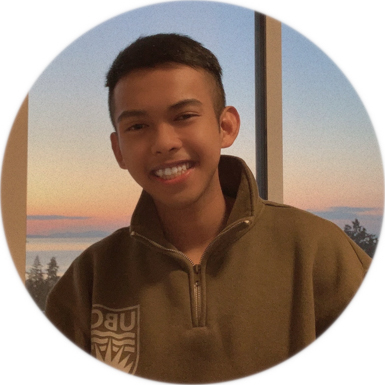
What student leadership opportunity had the most impact on you during your time at UBC?
My time at UBC Kababayan Filipino Students’ Association has given me the opportunity to explore and learn more about my culture and what it means to be a Filipino-Canadian. Being a part of this club allowed me to venture out and seek more knowledge, involvement, and empowerment which led me to become involved in two other organizations—Sulong UBC, a Filipino-Canadian student group with a critical analysis of what it means to be Filipinx on campus, in our communities, and in our personal lives; as well as FILCASA or Filipino Canadian Students’ Association, an umbrella community organization comprised of 26 student organizations that strive to define and cultivate a Filipino-Canadian identity on college and university campuses, and complement the social and cultural endeavors of our component organizations by connecting each other with Filipino communities across Canada to provide our members with new resources for personal and professional growth.
What did you learn about yourself at UBC?
I learned that it is okay to not know everything and to trust the process. Most, if not all students, have impressive backgrounds (both academic and extracurricular) when they enter UBC, so the pressure of trying to stand out in a crowd full of outstanding individuals can be nerve-racking. Instead of trying to stand out, I learned to blend in and learn from each of their experiences, which allowed me to explore what it is that I really wanted for myself and what are the things that I’m actually passionate about.
Priyam Joshi (she/her)
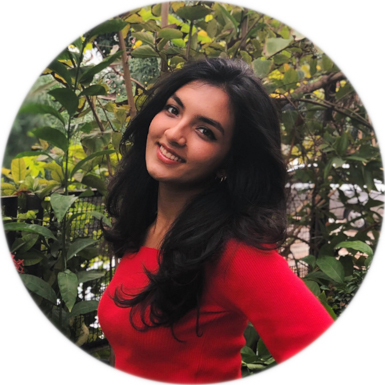
What student leadership opportunity had the most impact on you during your time at UBC?
My research experiences have been the most impactful opportunities for me. Thanks to UBC, my research career has spanned four countries and has led to tangible results which will enhance community well-being at large. Quick learning, creative thinking, and persistent problem solving are essential in research, but it is my leadership skills that have made me a truly valuable scientist. They helped me understand the technical aspects of research, motivate my team members, advance projects, incorporate multiculturalism and prioritize social justice in my work. In August 2021, I will begin my Ph.D.. I am confident the skills I have learned from UBC’s opportunities got me into the Ph.D. program and will help me be an effective leader in the public mental health field.
What did you learn about yourself at UBC?
I learned that I am driven by the concept that a world-class education, such as UBC’s, is a privilege, and it is a responsibility to use it to better as many lives as possible. I also learned that I am more than my anxieties and worries, what self-care truly means for me, and that my professors, mentors, peers, leaders, friends, and family are looking out for me.
Manjot Kaur Sekhon (she/her)

What student leadership opportunity had the most impact on you during your time at UBC?
The student leadership opportunity that had the most impact on my undergraduate journey at UBC is my executive position in the Law and Society Chats club. Being a part of that club allowed me to meet peers and community members with similar academic and career interests. Additionally, serving as president for the course of two years has allowed me to implement my learned knowledge in a real-world setting.
What did you learn about yourself at UBC?
My undergraduate journey at UBC has allowed me to expand my knowledge, network, and skills. Simultaneously, the help of my mentors, peers, and professors during my time at UBC has permitted me to discover my true passion for creating a more just society through an intersectional approach.
Ramneet Sidhu (she/her)
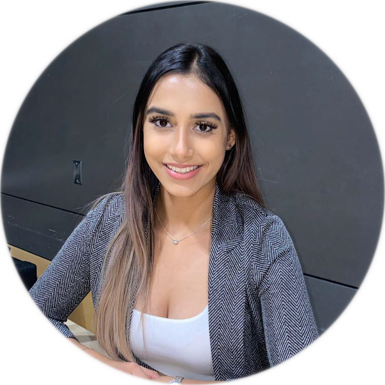
What student leadership opportunity had the most impact on you during your time at UBC?
Being the treasurer for the UBC Law and Society Chats club has had the most impact on me during my time at UBC because of the opportunities and connections it has led me to make. I have had the opportunity to work with UBC’s Law and Society department and connect with various faculty members. It has also allowed me to mentor students and organize events related to people of color and women’s issues in the GRSJ and LASO fields. These issues are close to my heart and I am grateful to have been granted these opportunities.
What did you learn about yourself at UBC?
I learned that I have unlimited potential if I work hard for what I want. Before coming to UBC, I excelled in all school subjects without studying all the time. Coming to UBC, I was hit with a much needed reality check. I realized I needed to study more to achieve the grades I wanted, and this has led to me to develop a greater work ethic and motivation!
Charlotte Stewardson (she/her)
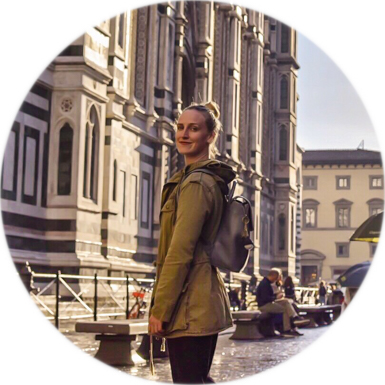
What student leadership opportunity had the most impact on you during your time at UBC?
The student leadership opportunity that has had the most impact on me has been my position as lab manager at the K.I.D. Studies Centre. Initially, I joined the lab because I really enjoyed working with school age children and I also loved learning about child development in my Psychology courses at UBC. Having the opportunity to train as well as learn from students who share my passion for both research and working with children and families has been an incredible experience that I will not forget. I am incredibly thankful for this position as it has also inspired me to pursue working in my community with children with developmental disabilities.
What did you learn about yourself at UBC?
I learned that I really enjoy research! I previously studied Fine Art and specialized in Sculpting. I had convinced myself that because I came from an art background, I wouldn’t be any good at the more science and math related subjects, and at the beginning I didn’t even bother applying for research positions. It took a lot of dedication and confidence boosting to take the initial plunge that I thankfully received from my peers, family, and friends but I am so glad I went for it because it has completely changed my career goals. I’ve also found ways to integrate my art background, which is extra fun!
Join us in congratulating all our psychology students on this recognition!
This article is republished from The Faculty of Arts. Read the original article here.
